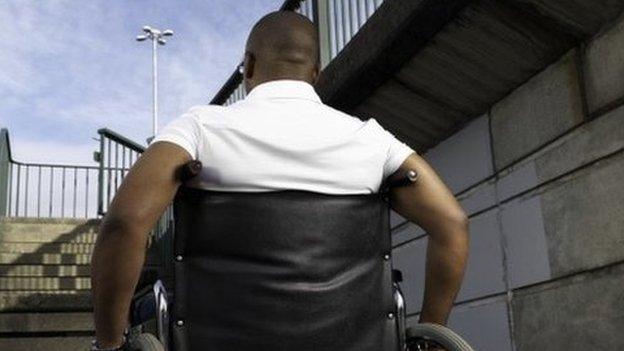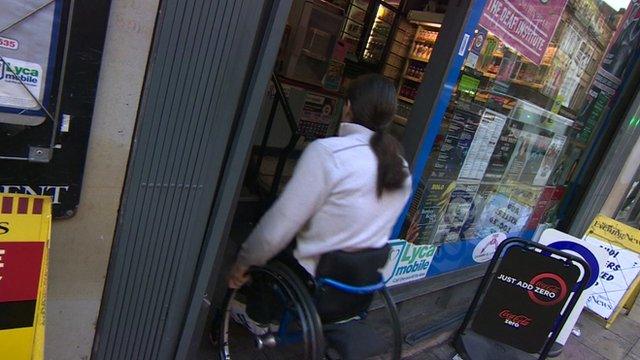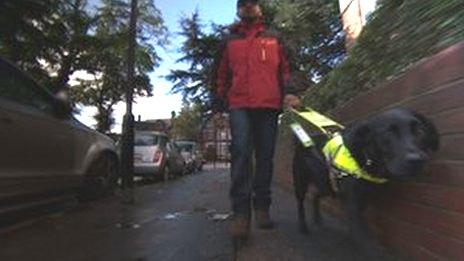Disabled people's access to High Street 'shocking', audit finds
- Published
- comments

Disabled people in the UK and their families are estimated to have a spending power of £200bn
Access for disabled people on the High Street in Britain is "shocking", according to a government audit of more than 30,000 shops and restaurants.
Thousands of venues had failed to adapt their premises, with a fifth of shops excluding wheelchair users, a survey found.
There are 12 million people in Britain with disabilities, with an estimated spending power of £200bn.
Businesses are "missing a trick" and must do better, ministers said.
Accessibility information providers DisabledGo visited all of the 30,000 venues in person to assess them, in the largest-ever audit of its kind in the UK.
Dr Gregory Burke, DisabledGo: "Businesses....are not communicating their access, so disabled people can't plan in advance"
They found a fifth of shops had no wheelchair access, only 15% of restaurants and shops had hearing loops and three quarters of restaurants did not cater for those with visual impairments.
When they asked leading chains directly for more information, only 4% of 105 national retailers responded.

"Men's departments always seem to be upstairs"
"They say 'Just ask and we will bring whatever you want'. How do I know what stock they have until I have seen it?" - John, Derby

"Everyone deserves to be able to go Christmas shopping or enjoy a festive meal or drink with their friends or colleagues," said Minister for Disabled People Mark Harper, who commissioned the survey.
Mark Harper MP: "Effectively these businesses are turning away potential customers"
"This isn't just about doing what's right. Businesses are missing a trick by not doing more to tap into this market.
"A fifth of the British population has a disability and they and their households have a spending power of over £200bn. Improving accessibility is a no-brainer."
Shadow minister for disabled people Kate Green said the report made for "depressing" reading.
"While businesses work hard to ensure their premises are accessible, some high street names are failing to make the reasonable adjustments they're required to do by law," she said.

Findings of disability audit
Less than a third of department stores have accessible changing rooms.
Two thirds of retail staff have no training in how to help disabled customers
40% of restaurants and a third of department stores do not have an accessible toilet.
20% of high street shops have no ramps for wheelchairs
Only 15% of retailers have hearing loops for shoppers with hearing impairments.

"While it's welcome the Department for Work and Pensions have commissioned this report, this Tory-led government has weakened the Equality and Human Rights Commission that helps enforce disability discrimination law.
"Ministers must say what they are going to do to ensure business meets its obligations to disabled people, especially what help they will give small local businesses."
'Unacceptable'
Barry Stevenson, chairman of DisabledGo and a former director of Marks and Spencer, said: "We are pleased that many retailers have invested significantly in improved accessibility in the last 10 years, but the majority are still not doing enough."
"It's entirely unacceptable for disabled people, their family, friends and carers, not to be able to access all high street shops and facilities."
"Disabled people are not asking the earth; just that management do what's reasonable and think more about how they can help disabled customers better.
"And that includes better communication about their accessibility online.
"It doesn't need to cost a fortune to do the right thing and it could be the deciding factor for disabled customers between you and a competitor."
The Equality Act of 2010 obliges organisations to make reasonable adjustments for disabled people.
Ministers previously put a value of £80bn on the spending power of people with disabilities. But this was re-calculated earlier this year to include friends and family of disabled people, not just disabled people themselves, resulting in the larger figure.
- Published6 December 2014

- Published10 November 2014

- Published23 October 2014
.jpg)